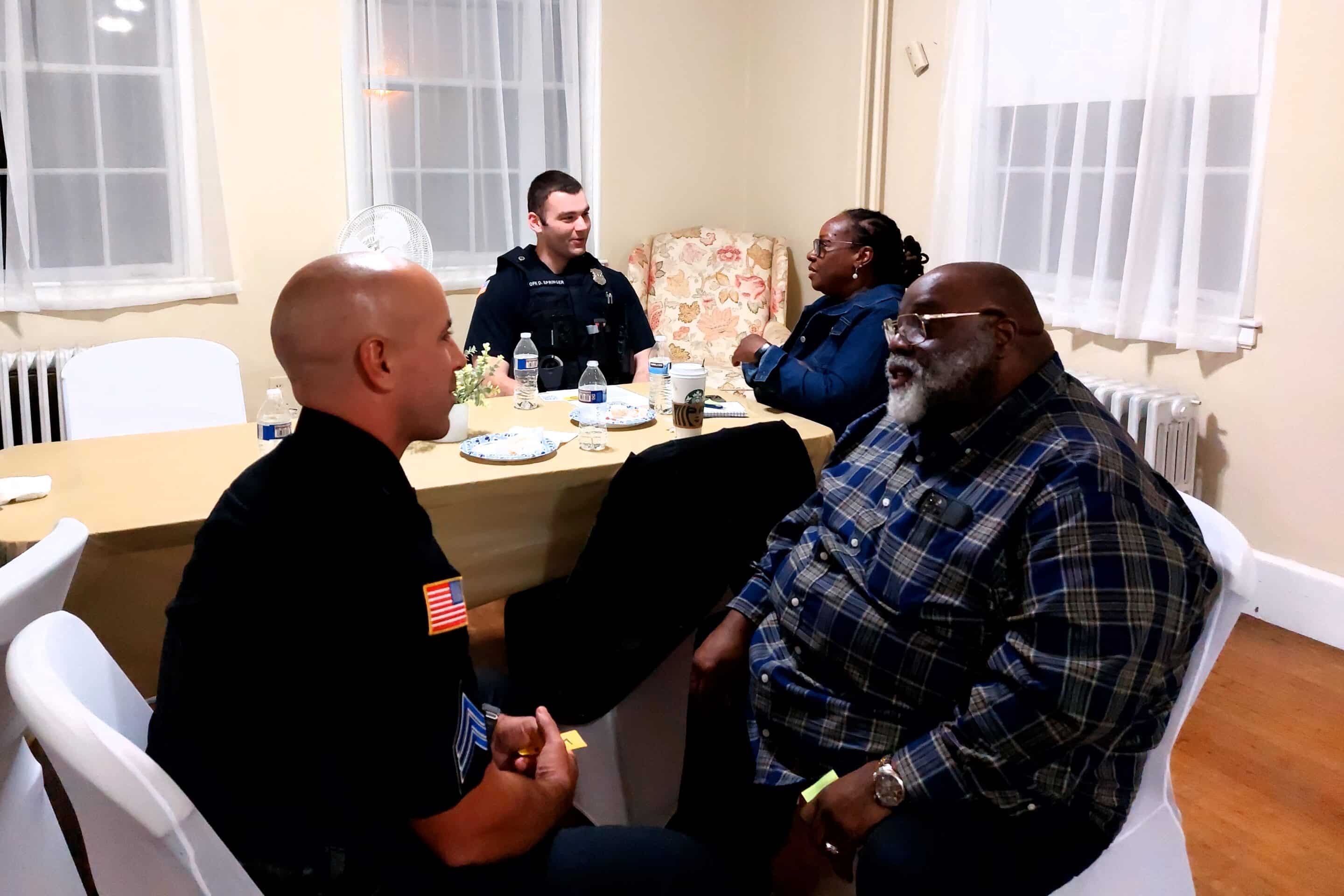Law enforcement and residents share their experiences during a community meeting at Wesley United Methodist Church.
Reminder Publishing photo by Sarah Heinonen
SPRINGFIELD — Recently, amid a casual atmosphere with a light dinner of pizza and sandwiches at Wesley United Methodist Church, residents and law enforcement took part in the challenging work of coming together to find middle ground and a way to move forward.
Of the roughly 70 people that attended the meeting on Sept. 26, more than half were residents from around city, including City Councilors Lavar Click-Bruce and Zaida Govan, NAACP Springfield chapter President Bishop Talbert Swan and secretary Freda Malone.
There were also at least a dozen members of the Springfield Police Department. Superintendent Lawrence Akers was there, as were members of the Department of Justice and Springfield Police Commissioners Gary Berte and Albert Tranghese.
The goal of the meeting was to create a foundation to build a community engagement plan, part of the 2022 settlement agreement stemming a federal investigation that found the Springfield Police Department’s Narcotics Bureau, now named the Firearms Investigation Unit, engaged in a pattern or practice of excessive force.
Wesley United Methodist Church pastor Catharine Cummings began by asking people to share a time in their lives when they were uncomfortable. One person recalled their first day of bootcamp, another said they were uncomfortable when their friend told them she was a victim of abuse.
Cummings spoke about seeing uniforms in a church, whether they be choir robe, Scouts or police officers. She asked how people felt about seeing guns in the church.
“Right now, I know I’m safe, but if I got pulled over, that’s when I’d feel that tense [feeling] in my chest and stomach,” said Rev. David Lewis, the president of the Pioneer Valley Project.
Akers responded by saying, “When a police officer pulls you over, our hearts are thumping.” He added that the police have guns, but so might the people they pull over.
Offering a hopeful tone, Capt. Brian Beliveau of the Settlement Implementation Unit, said, “I see two things in this room — one is friends. The other is new friends.” He said the church was “a safe space for us to talk. We need to have a shift in how we’re seen in this community.”
PVP Executive Director Tara Parrish explained that the conversations people were about to have were not about policing. Instead, she said the meeting was about “inviting us to share a little of who we are” with one another and exploring their discomfort “in the best possible way.”
People had been handed numbers as they walked through the door. Law enforcement had received one set of numbers and residents received another. The group was instructed to pair up with whomever had the same number. Out of necessity, some law enforcement members partnered with more than one resident.
The pairs were instructed to discuss “something you are proud of and how did it shape you?” For eight minutes, people had intimate conversations with one another, taking turns discussing their lives while their partners nodded or exchanged genuine smiles.
Then, the residents and law enforcement members were told to find another partner. This time, they were prompted to tell a story about when they had felt powerless and how it had impacted their lives. The last conversation, with yet another partner, was about a time when each of them had felt heard.
When the conversations had ended, people gathered in groups of about half a dozen, all of which included at least one member of law enforcement.
“We’re going to get down to it,” said Mass Senior Council Community Organizer Tracey Carpenter, who helped facilitate the meeting. The groups took a few minutes to brainstorm effective elements of the police engagement plan.
When the groups shared their ideas, written on sticky notes, the word that was heard most in the room was “trust.” To create that, people suggested more walking patrols, so law enforcement gets to know the people and residents become more comfortable around police, as well and actively creating opportunities for engagement at community events and schools.
People said there should be access to information and transparency. Govan, who read her group’s suggestions, said to the police in the room, “When we know [what is happening], maybe we can support you.”
Other groups talked about “attitude” and not assuming one person is being “disrespectful” because of how they are addressing the other. Other topics that were mentioned included accountability and duty to intervene among police officers and residents becoming comfortable with speaking up to officers.
The organizers will take the ideas they received and bring a draft engagement plan back to Wesley United Methodist Church on Oct. 10 for community editing and feedback.
At the end of the session, attendees called out words that reflected how they were feeling about the work that they had done together. People said they were “hopeful,” “optimistic,” “comfortable,” “inspired,” “heard” and “safer.” Others used the words “foundation,” “ground-breaking” and “beginnings.”


